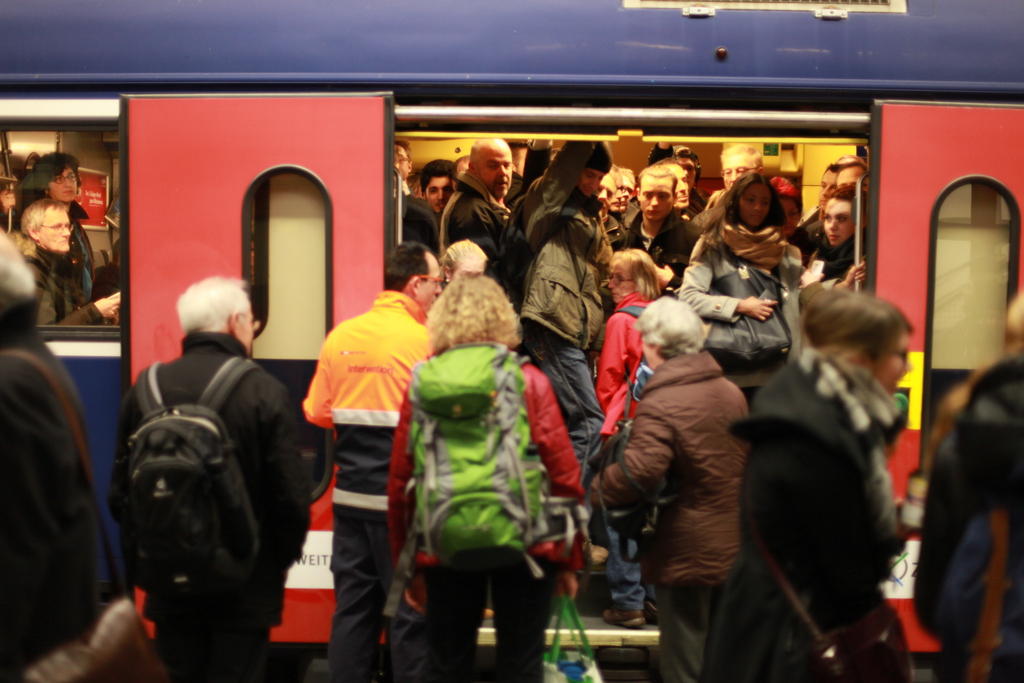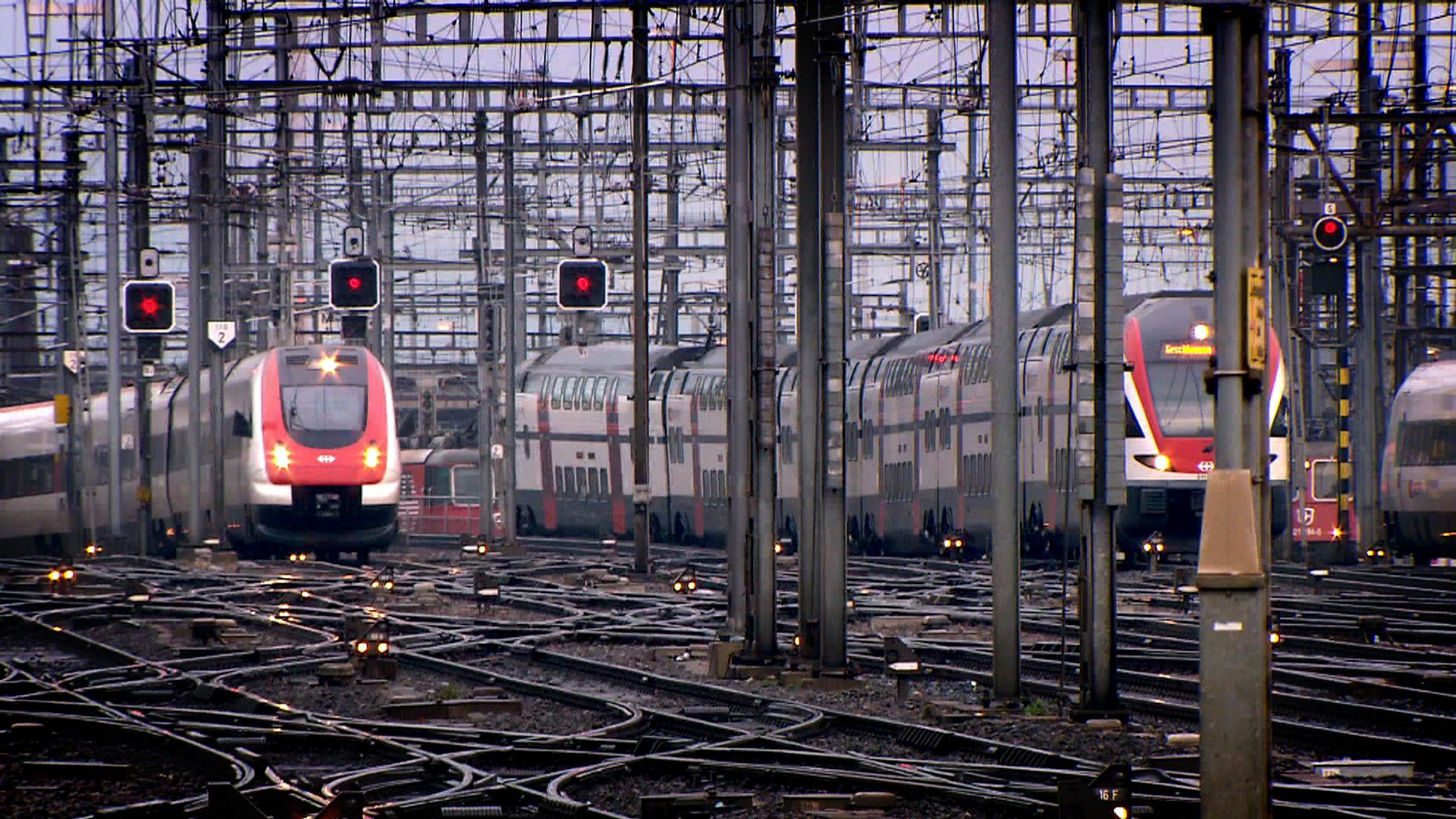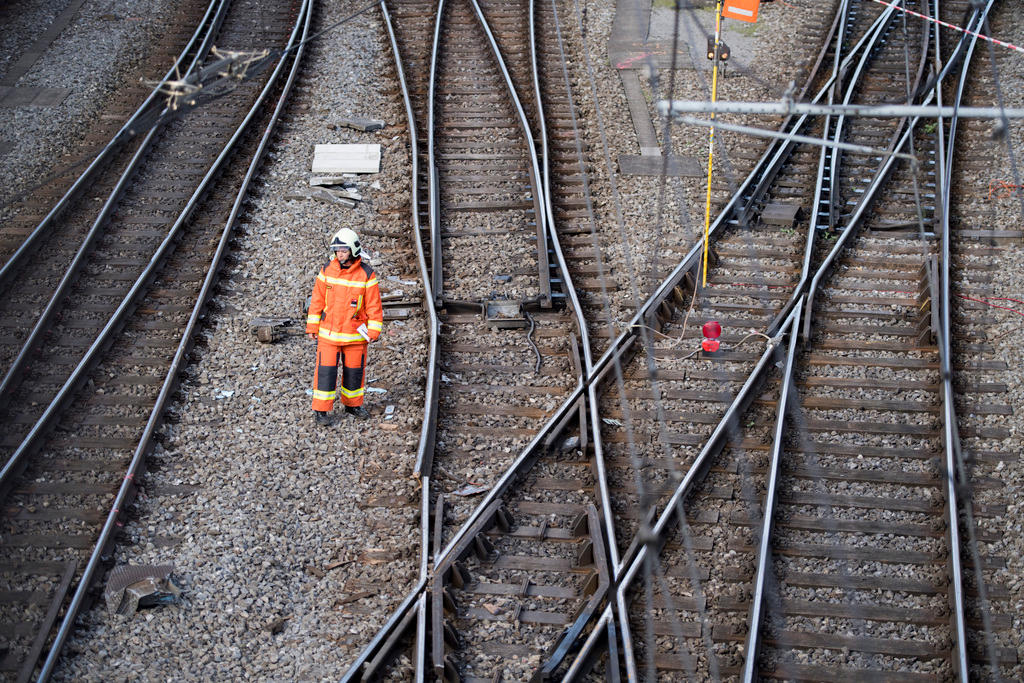
Trains are taking the strain, even in Switzerland
“Let the train take the strain,” says an old British Rail slogan. But this is starting to take on a new meaning as rail systems around the world come under more and more stress. Swiss rail, despite its good reputation, is no exception.

Rail accidents in IndiaExternal link, chaos at UK rail hub Waterloo and interest in space-age rail proposalsExternal link all have at their root the same problems: ageing infrastructure, ever increasing numbers of passengers and funding problems.
Switzerland is clearly not India. Its rail network is renowned for formidable engineering and punctuality. But the Swiss rail system is also under pressure, and passengers are taking the strain.
“I have to be out before six every morning to avoid overcrowding on the train, even in first class, and I’m getting fed up,” says one passenger who commutes every day from Lausanne to Bern. “Plus there are loads of problems at the moment, with delays and train cancellations.”
“I’m generally satisfied, but they’re doing a lot of work and sometimes there are delays,” says a young man who travels to work daily from Rolle to Lausanne, along the shores of Lake Geneva. He says this was particularly the case in summer 2016 “when they were changing the points system”.

More
The heart of the Swiss railways
“If you don’t check the app on your phone before you leave [the house], you can be surprised by train cancellations and delays,” says a young woman who has been commuting along the Lake Geneva line for 11 years. “And there isn’t much information at the station. Plus, it puts people without mobile phones at a disadvantage.”
The Swiss Federal Railways says it puts customer satisfaction “at the heart of what we do” and invites feedback. According to its websiteExternal link, at the start of September passengers gave only 2.5 out of five stars for “overall satisfaction”, although this fluctuates. The score was the same for “punctuality”, while “understanding” and “price” were rated only 1.5 out of five on September 1.
Funding challenge
“Between now and 2040, the government expects an increase of about 50% in demand for passenger and freight rail transport,” says Florence Pictet, a spokeswoman for the Federal Office of Transport. “We need to find appropriate solutions to absorb this increase and channel it.”
As well as coping with increasing numbers of passengers, technological developments, new consumer habits and competition, a big issue for the future of Swiss railways is funding – as in many countries. A large part of funding comes from the state (see box).
“It’s important that the state continues to invest in public transport,” Pictet told swissinfo.ch. “At the same time, public funds (i.e. taxpayers’ money) are not without limit, so we must use them in the best way possible. The excellence of the Swiss public transport system has a price, and users must share the burden.”

More
Train disruption throws daily life off track
Swiss railways are already working to try to cope with more and more passengers. “Building new railway lines and increasing speed are not the priority,” Pictet says. “The priority is to optimise the network through upgrading, so as to increase capacity – to have more trains and longer trains with more seating.”
This involves more and bigger trains, both longer and higher (“double-decker”), which means extending platforms and in some cases destroying bridges.
“The Confederation is putting CHF12 billion ($12.5 billion) into railway upgrade projects by 2025,” Pictet said. “A big chunk of this CHF12 billion is for the French-speaking part of Switzerland. Over CHF3 billion alone is going towards major work that is underway or planned to modernise the rail saturation points of Renens, Lausanne and Geneva.”
Saturation points
Indeed, one of the most saturated routes is around Lake Geneva, particularly between Lausanne and Geneva. Plans looking ahead to 2030 include doubling the capacity of the Lausanne-Geneva line and major upgrade works to stations, including the art-deco fronted one in Lausanne, dating from the 19th century.
“Lausanne station is not suited to cope with the big passenger flows expected in the future,” federal railways spokesman Frédéric Revaz told swissinfo.ch. “The underground walkways are too narrow, as are the platforms. The platforms also need to be extended by 420 metres to take longer, double-decker trains.”
Revaz says station upgrades elsewhere have paid off. “The station building in Geneva has been completely transformed and clients now have a lot more space and services. They also have a station that is livelier and has more light, which improves the sense of security. We have had the same success in Zurich, with the opening of Löwenstrasse station.”
But not everyone is happy. In Gland, a well-heeled dormitory town between Lausanne and Geneva, the station looks like a big construction site, and it is not easy to find your way out. “Everyone is complaining and no one understands,” says one woman who works there.
Revaz says the biggest challenge for the federal railways is to “reconcile the engineering works and the circulation of trains so that customers are not inconvenienced”.
The Swiss government, through the Federal Office of Transport, is responsible for planning and funding national infrastructure, as well as projects it supports in neighbouring countries, notably France and Italy. It co-funds regional services with the 26 cantons.
The Federal Railways is the national operator. Since 1999 it has been a company operating on commercial lines, although all the shares are owned by the government.
There are also a host of regional operators. Train timetables are designed to interconnect with other forms of public transport, including “post buses” serving rural and remote mountain destinations not served by train.

In compliance with the JTI standards
More: SWI swissinfo.ch certified by the Journalism Trust Initiative





























You can find an overview of ongoing debates with our journalists here . Please join us!
If you want to start a conversation about a topic raised in this article or want to report factual errors, email us at english@swissinfo.ch.